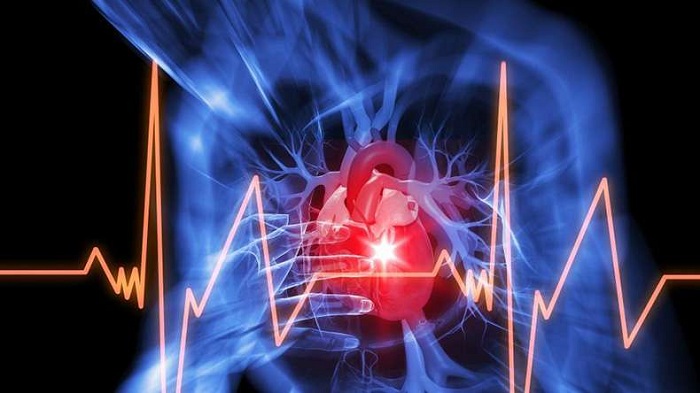However, when the gland is underactive (a condition called hypothyroidism, associated with too little thyroxine) or overactive (a condition called hyperthyroidism, associated with too much thyroxine), it can wreak havoc on your body.
Scientists have long known that thyroid problems that stem from an imbalance of its hormones may be associated with subsequent heart problems, from an irregular heartbeat to cardiovascular disease.
Now, they`ve added sudden cardiac death to that list of potential heart problem connections, according to a new study published in the journal Circulation on Tuesday.
"Our study suggests that persons with higher thyroid hormone levels, even within what we consider the normal range of thyroid function, have a four-fold increased risk of sudden cardiac death compared to persons with lower thyroid hormone levels," said Dr. Layal Chaker, research fellow in endocrinology and epidemiology at Erasmus University Medical Center Rotterdam in the Netherlands, lead author of the study.
"The risk factors that were known for sudden cardiac death were mainly the `traditional` cardiovascular risk factors, including high cholesterol and high blood pressure. However, it was not known that higher thyroid hormone levels could also be a risk factor for sudden cardiac death," she added. "Our study shows that thyroid function at the high end of normal is a risk factor."
Sudden death risk?
The current study involved health data on 10,318 adults, ages 45 and older, from Rotterdam. The data, which included information on each person`s thyroid and heart health, were collected from 1990 to 1993, 2000 to 2001, and 2006 to 2008.
After controlling for age, sex and various heart disease risk factors, such as smoking or high cholesterol, the researchers analyzed the data. They compared levels of thyroxine in blood samples of the adults with how many of them died of sudden cardiac death.
They discovered that higher levels of thyroxine were associated with an increased risk of sudden cardiac death, independent of other cardiovascular risk factors. The data showed that the risk of dying due to sudden cardiac death increased from 1% to 4% with higher thyroxine levels over a 10-year period. The researchers indicated that their findings probably would be similar in the United States.
Why are higher levels of the thyroid-stimulating hormone associated with an increased risk of sudden cardiac death? "Our hypothesis was that thyroid hormone levels could increase the risk of sudden cardiac death by affecting cardiovascular risk factors such as blood pressure levels," Chaker said.
However, "we were surprised to see that when we control our analyses for these factors, the association remained similar, suggesting that other pathways could play a role," she added.
"Thyroid hormone has different effects on the cardiovascular systems, and future studies should pinpoint which pathway could be responsible for the increased risk of sudden cardiac death with higher thyroid hormone levels. This could lead to better assessment of individual risk and identify possible prevention targets."
Sudden cardiac death, generally caused by the heart abruptly ceasing to function, accounts for 300,000 to 400,000 deaths annually in the United States.
Being able to predict sudden cardiac death in the general population is difficult, but the researchers hope that this new study may help identify thyroid hormone levels as a possible screening tool for assessing risk of sudden cardiac death.
"However, we were not able to study the effect of possible treatment of high thyroid function in the prevention of sudden cardiac death, and this requires further research," Chaker said.
Your thyroid and your heart
Although the new study`s findings focus on thyroid hormones in the high end of the normal range, they shouldn`t overshadow the cardiovascular health risks associated with low thyroid hormone levels too, said Martin Gerdes, professor and chairman in the New York Institute of Technology`s College of Osteopathic Medicine, who was not involved in the study.
"Within the normal range of thyroid hormone levels, many other studies show that cardiac patients on the low end had more cardiac risks than those on the high end," Gerdes said.
"My worry is that results for this study ... may encourage physicians to undertreat low thyroid conditions in cardiac patients," he said. "For proper heart health, it is important to have normal thyroid hormone function. Thyroid hormone levels directly affect cardiac contraction, relaxation and coronary blood flow."
He added that often thyroid hormones may offer benefits to treat heart disease. But many physicians are afraid to use them due to the risk of accidental overdosing, which may lead to increased arrhythmias and sudden death, such as what has been outlined in the new study.
"There are so many people around the world dying of heart disease that is likely accelerated due to having low cardiac tissue hormone levels," Gerdes said. "We need a serum biomarker that identifies patients with low cardiac tissue thyroid hormone levels who may benefit from treatment. This would revolutionize the field and help resolve some of the conflicting reports."
About 3% of the general population is treated with thyroid medication, Chaker said. She hopes patients receive the treatment they need without being over-treated.
"In these individuals, the thyroid hormone levels are modifiable by decreasing the dose of therapy," she said, "and thereby perhaps decreasing sudden cardiac death risk."
More about:























-1745485667.jpg&h=190&w=280&zc=1&q=100)
























